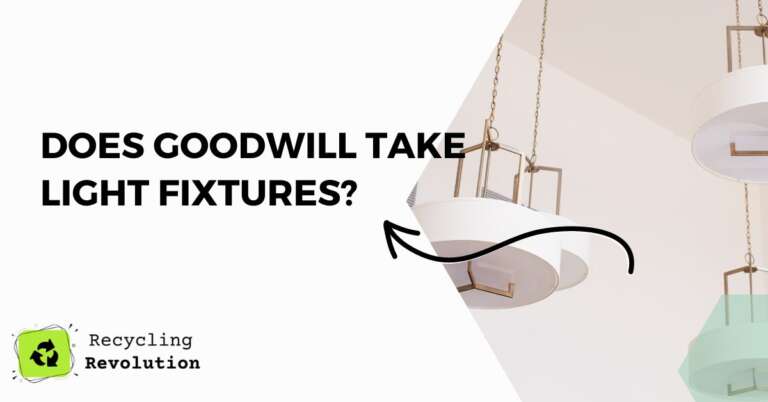In a world facing the challenges of pollution and waste management, the act of responsible disposal and donation of items, like light fixtures, is not just a charitable gesture, but a step towards sustainable living.
Light fixtures, in their myriad forms and designs, have a significant lifespan. When you opt for a new design, or when your fixtures have run their course, the choice to donate instead of discarding can make a world of difference.
Goodwill Industries, a non-profit organization with a century-long history, stands at the forefront of this environmentally-friendly and socially conscious approach. Operating numerous stores across the United States and Canada, Goodwill has made a name for itself by accepting donations of various items and selling them to support job training and employment services.
Factors That May Influence Acceptance of Specific Items
The acceptance of specific items by Goodwill often depends on the item’s condition, marketability, and safety regulations. For example, items must be in sellable condition, be in demand by shoppers, and meet current safety standards.
Donating Light Fixtures to Goodwill
Exploring the Acceptability of Light Fixtures
Now, what about light fixtures? As a standard policy, Goodwill accepts light fixtures that are in good, working condition. However, there are several influencing factors you should consider before packing your used fixture for Goodwill.
Condition and Functionality of the Light Fixtures
The light fixture you plan to donate should be in working condition with no missing or broken parts. Goodwill cannot repair or refurbish items, so fixtures must be in a condition that allows them to be put on the shelf immediately after donation.
Types of Light Fixtures Accepted
Whether it’s a table lamp, a floor lamp, or a ceiling fixture, Goodwill generally accepts all types of light fixtures. However, the acceptance can vary depending on the specific location and their current inventory.
Local Goodwill Branch Policies and Storage Space Availability
Each Goodwill branch may have its own policies regarding donations based on local needs and storage availability. It’s always a good idea to call your local branch to confirm before bringing in your light fixtures.
Table of Light Fixtures Goodwill Accepts and Doesn’t Accept
| Type of Light Fixture | Generally Accepted | Not Accepted |
|---|---|---|
| Ceiling fixtures | Yes | If broken or missing parts |
| Table lamps | Yes | If broken or missing parts |
| Floor lamps | Yes | If broken or missing parts |
| Wall sconces | Yes | If broken or missing parts |
| Outdoor fixtures | Yes | If broken or missing parts |
Please note, this table is a generalized guide. Always contact your local Goodwill store to confirm what they can and cannot accept.
Alternatives to Goodwill for Donating Light Fixtures
- Local Habitat for Humanity ReStore – If for some reason, Goodwill cannot accept your light fixtures, don’t despair. Habitat for Humanity ReStore is nonprofit home improvement stores and donation centers that accept a variety of goods, including light fixtures.
- Community-Based Thrift Stores and Secondhand Shops – Your local thrift stores and secondhand shops could be another alternative. These stores often support local charities and can be a great place to donate items like light fixtures.
- Online Platforms and Classifieds for Local Donations – Online platforms such as Freecycle or classifieds like Craigslist also provide avenues to donate items to people in your local community.
Tips for Donating Light Fixtures Responsibly
Clean and Prepare the Light Fixtures for Donation
Before donating, clean your light fixtures and ensure they’re in working order. This not only increases the chances of your donation being accepted but also makes it more appealing to the next owner.
Packaging and Transportation Considerations
Carefully package your light fixtures to avoid any damage during transportation. Using bubble wrap or newspaper can help protect delicate parts from breaking.
Documentation for Tax Deductions (if applicable)
Keep a detailed record of your donations. If you itemize deductions on your federal tax return, you may be entitled to claim a charitable deduction for your Goodwill donations.
Other Eco-Friendly Options for Light Fixture Disposal
Recycling Options for Broken or Outdated Light Fixtures
If your light fixtures are broken or outdated, recycling might be a better option. Many components of light fixtures can be recycled, including metal parts and certain types of light bulbs.
Contacting Local Recycling Centers and Waste Management Authorities
Reach out to your local recycling center or waste management authority for information on how to recycle your old or broken light fixtures. They can provide specific instructions based on your locality’s regulations.
Conclusion
In conclusion, Goodwill is a viable option for donating your used light fixtures, provided they are in good, working condition. However, there are other alternatives, like Habitat for Humanity ReStores, local thrift stores, and online platforms, if Goodwill is unable to accept your donation.
It’s crucial to find suitable donation or disposal options for your light fixtures to support sustainability and community development. Whether it’s through donation or recycling, responsible disposal of light fixtures is a step towards an eco-friendly lifestyle.
FAQs
Does Goodwill take light fixtures for donations?
Yes, Goodwill generally accepts light fixtures that are in good, working condition. However, policies may vary by location, so it’s best to contact your local Goodwill store for specifics.
What does Goodwill accept in Oregon?
Goodwill in Oregon accepts a wide range of items including clothing, books, furniture, and household items. Light fixtures in good condition are generally accepted. Again, it’s recommended to contact your local store to confirm.
Does Goodwill take light fixtures near me?
Goodwill’s acceptance of light fixtures can vary by location. Contact your local Goodwill store to confirm whether they accept light fixtures.

